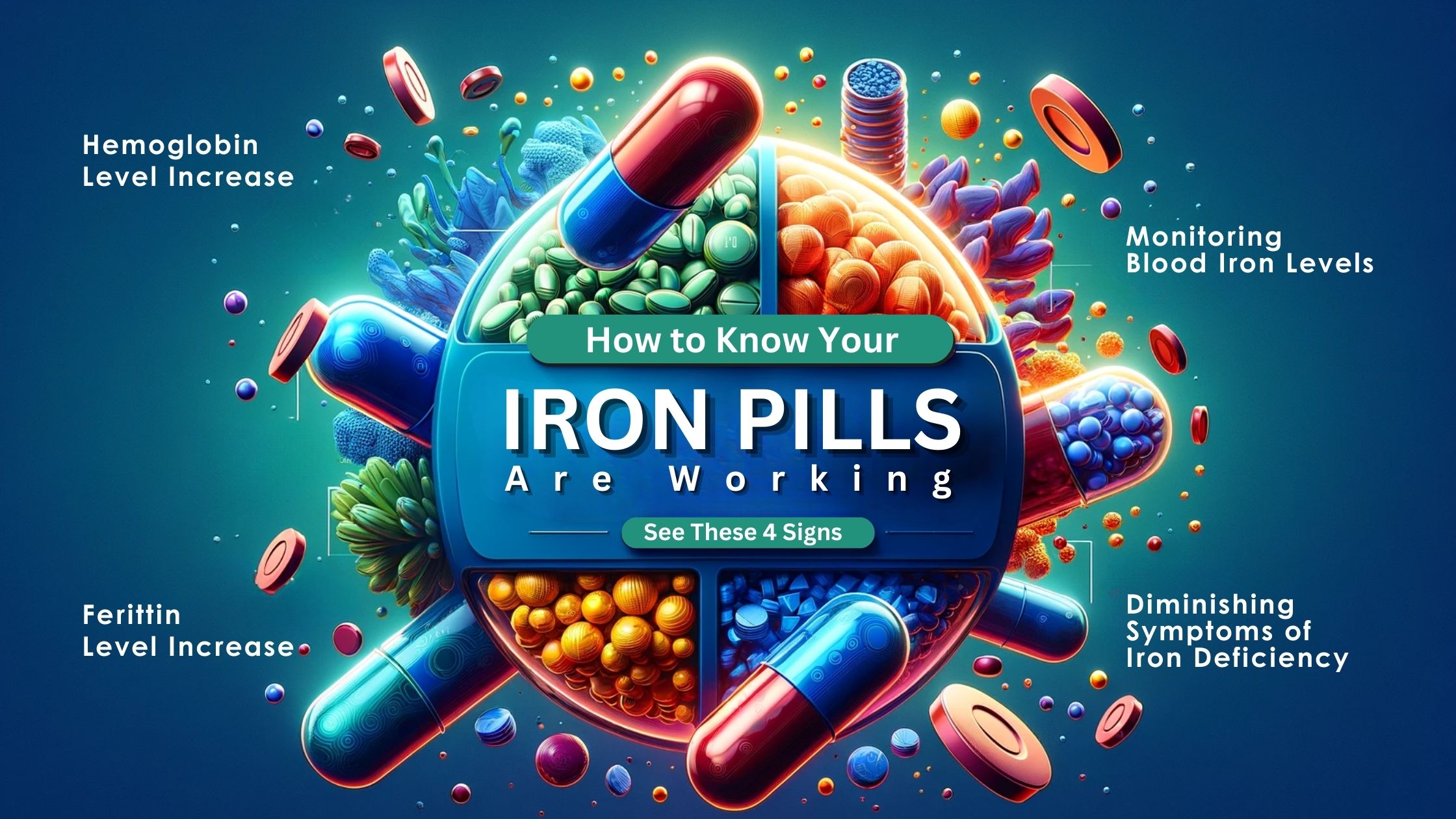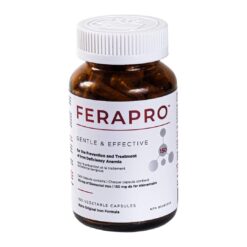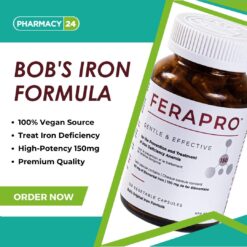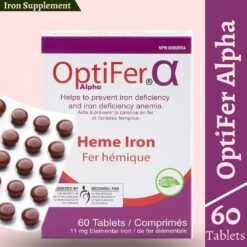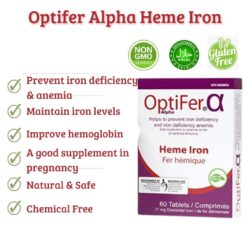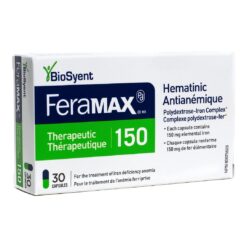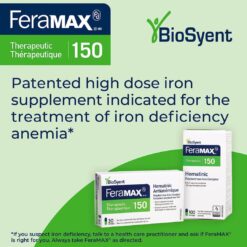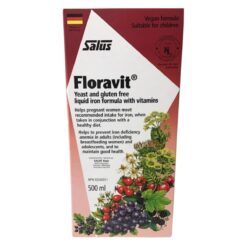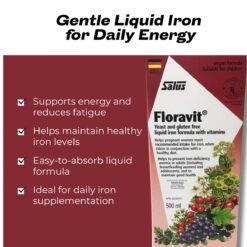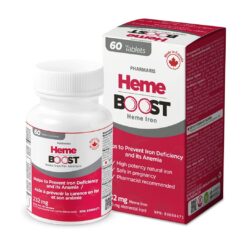Iron deficiency is a common health concern, particularly in certain populations such as women and the elderly.
Iron supplements are often prescribed to combat this deficiency and its symptoms.
This blog post focuses on identifying the Signs Iron Pills are Working, essential for those undergoing treatment for iron deficiency anemia.
A quick look at the top 5 best iron supplements
|
Buy Now |
|
Buy Now |
|
Buy Now |
|
Buy Now |
|
Buy Now |
The Role of Iron in the Body
Iron plays a vital role in the body, particularly in the formation of hemoglobin, a component of red blood cells that transports oxygen.
When the body lacks sufficient iron, it can’t produce enough healthy red blood cells, leading to iron deficiency anemia. 15 Signs You Are Iron Deficient
Symptoms of this condition include fatigue, weakness, and pale skin. To understand more, read our post on ‘15 Signs You Are Iron Deficient‘, which further explores these important indicators.
Understanding these symptoms is crucial for identifying the effectiveness of iron supplements. [Source]
Diagnosing Iron Deficiency
Iron deficiency is typically diagnosed through blood tests that check hemoglobin and ferritin levels.
Ferritin is a protein that stores iron, and low levels can indicate iron deficiency. These tests help in determining the severity of the deficiency and in monitoring the effectiveness of iron supplements.
To understand your iron levels better, delve deeper into our detailed article ‘The Four Main Causes of Iron Deficiency Anemia‘
Key Indicators of Iron Supplement Effectiveness
Hemoglobin Level Increase
One of the primary indicators that iron pills are working is an increase in hemoglobin levels.
Hemoglobin, a critical component of red blood cells, is responsible for transporting oxygen throughout the body.
An increase in hemoglobin levels often correlates with a reduction in symptoms like fatigue and weakness.
Monitoring hemoglobin levels through blood tests is essential to track the effectiveness of iron supplementation. [Source]
Improvement in Ferritin Levels
Ferritin, the protein that stores iron in the body, is another vital indicator.
Low ferritin levels are commonly associated with iron deficiency. As iron supplements begin to work, ferritin levels should gradually increase, indicating improved iron storage.
This improvement can be monitored through periodic blood tests.
Monitoring Blood Iron Levels
Regular monitoring of blood iron levels is crucial in assessing the effectiveness of iron supplementation.
This involves routine blood tests ordered by a healthcare provider. These tests help in adjusting dosage and ensuring that iron levels are within a healthy range. [Source]
Diminishing Symptoms of Iron Deficiency
As iron supplements begin to work, one of the most noticeable changes is the improvement in symptoms associated with iron deficiency.
Patients often report a reduction in fatigue, weakness, and pallor. Additionally, improved cognitive function decreased dizziness, and relief from shortness of breath are common as the body starts to recover from anemia.
It’s important to track these changes and discuss them with your healthcare provider. [Source]
Choosing the right supplement is crucial after understanding these indicators.
Learn more about iron deficiency and its management in our comprehensive guide ‘Top 5 Best Iron Supplements‘.
Expected Timeframe for Symptom Improvement
The timeframe for experiencing an improvement in symptoms can vary depending on the severity of the iron deficiency and individual health factors.
Generally, patients may start to feel better within a few weeks of consistent iron supplementation.
However, it may take several months for iron levels to normalize completely and for all symptoms to resolve.
Consistency in taking iron supplements as prescribed is key to recovery.
Guidelines on Iron Supplementation Dosage and Frequency
Proper dosage and frequency of iron supplementation are crucial for effective treatment.
The recommended dosage varies based on individual factors like age, gender, and the severity of iron deficiency.
Over- or under-supplementation can lead to complications, making it essential to follow a healthcare provider’s prescription.
Typically, iron pills are taken once to three times a day, and it’s advised to consume them on an empty stomach to enhance absorption.
For the best iron supplement selection, refer to Top 5 Best Iron Supplements for Women.
The Importance of Regular Monitoring by Healthcare Professionals
Regular monitoring by healthcare professionals is vital to assess the effectiveness of iron supplements and to adjust dosage as needed.
This typically involves routine blood tests to measure hemoglobin and ferritin levels.
Regular consultations also help in managing any side effects and ensuring optimal iron levels.
Enhancing Iron Absorption Through Diet
Diet plays a significant role in enhancing the absorption of iron from supplements.
Consuming iron-rich foods like leafy green vegetables, lean meats, and beans can be beneficial.
Additionally, pairing iron supplements with vitamin C-rich foods like citrus fruits can further improve absorption.
However, certain foods and beverages, like coffee and dairy, can inhibit iron absorption and should be consumed separately from iron supplements. [Source]
Common Side Effects of Iron Pills
While iron supplements are generally safe, they can cause side effects in some individuals.
Common side effects include stomach upset, constipation, nausea, and dark stools.
These effects can often be managed by adjusting the dose, changing the type of iron supplement, or taking the supplement with food.
It’s important to communicate any side effects to a healthcare provider. [Source]
Balanced Approach to Iron Supplementation
Maintaining a balanced approach to iron supplementation is crucial. Over-supplementation can lead to iron overload, which poses health risks.
Therefore, it’s essential to follow prescribed doses and undergo regular monitoring.
Iron supplementation should be viewed as part of a broader strategy for managing iron deficiency, which includes dietary adjustments and addressing any underlying health issues.
Conclusion: Recognizing the Effectiveness of Iron Supplementation
Identifying the Signs Iron Pills are Working is key to effectively managing iron deficiency anemia, it’s important to choose a product that aligns with your health needs.
FeraMAX Capsules are trusted by many for their efficacy and quality.
From observing increases in hemoglobin and ferritin levels to witnessing the improvement of deficiency symptoms, these indicators are essential markers of recovery.
It’s important to adhere to the prescribed iron supplementation regimen and maintain regular consultations with healthcare professionals for optimal management.
Additionally, incorporating dietary adjustments to aid iron absorption and being mindful of potential side effects are crucial aspects of a holistic treatment approach.
-
$24.99 – $70.99Buy Now This product has multiple variants. The options may be chosen on the product page
-
$25.99 – $77.99Buy Now This product has multiple variants. The options may be chosen on the product page
-
$29.99 – $66.99Buy Now This product has multiple variants. The options may be chosen on the product page
